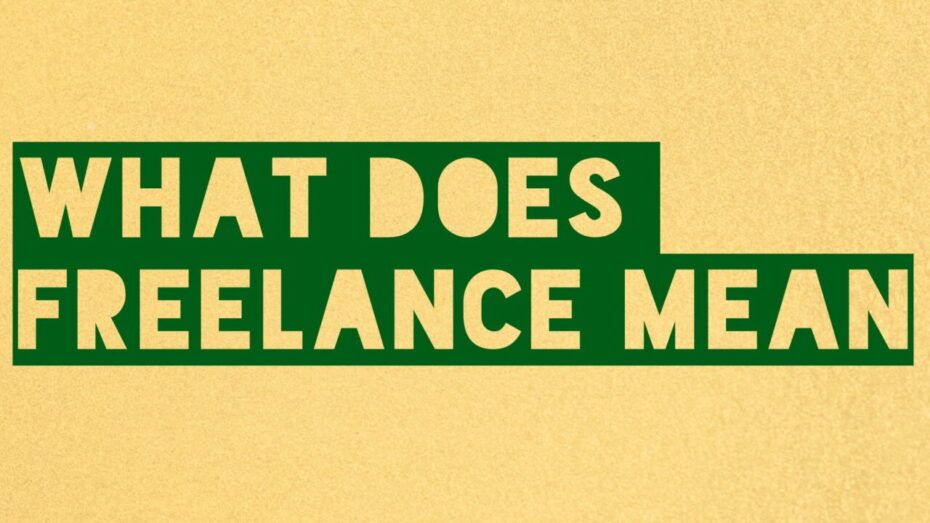What does freelance mean in today’s rapidly evolving work environment? How can it offer a path that diverges from the traditional 9-to-5, providing both challenges and opportunities unique to this mode of work?
In exploring the essence of freelancing, one embarks on a journey to understand not just a way of working, but a way of living that prioritizes flexibility, independence, and the pursuit of passion. My intention is to peel back the layers of freelancing to reveal its core benefits and considerations.
Freelancing, in my view, represents the pinnacle of professional freedom and flexibility. It’s a realm where your career path is not dictated by the conventional boundaries of office walls or the rigid schedules of a full-time job. Here, you are the architect of your destiny, choosing when, where, and on what terms you work.
This level of autonomy can lead to not only a more satisfying work-life balance but also the opportunity to handpick projects that truly resonate with your skills and interests. However, it’s important to navigate this freedom wisely to maintain a steady stream of work and income.
As we delve deeper into the nuances of freelancing, my recommendation for aspiring freelancers is to consider not just the freedom this path offers, but also the responsibilities it entails.
Table of Contents
Defining Freelancing: A Comprehensive Overview
What exactly encompasses the term “freelancing,” and how does it differentiate from traditional employment? In the realm of work, freelancing stands out as a beacon of autonomy and personal initiative.
This section intends to unravel the layers of freelancing, providing clarity on what it means to be a freelancer and how this form of employment is reshaping the workforce landscape.
Freelancing, by definition, refers to offering your skills and services on a project-by-project basis, without the long-term commitments typically associated with traditional jobs. This mode of work allows individuals to weave a tapestry of assignments from various clients, maintaining control over their workload and the direction of their career.
The key advantage here lies in the freedom to choose projects that align with one’s interests and values, offering a unique blend of professional fulfillment and flexibility.
Moreover, the freelance economy is growing, fueled by a shift towards digital nomadism and the gig economy. This evolution reflects a broader change in societal values towards work-life balance and the desire for meaningful, self-directed careers.
For those considering a freelance path, it’s essential to understand not only the allure of freelancing but also the challenges it presents, such as income variability and the need for self-discipline. The successful freelancer navigates these waters with a blend of skill, adaptability, and resilience.
The Core of Freelancing: Independence and Flexibility
Why do so many professionals pivot towards freelancing when seeking independence and flexibility in their careers? The essence of freelancing lies in the unparalleled autonomy it offers, empowering individuals to design their work lives around their personal goals, preferences, and schedules. This section explores the profound impact of such independence on a freelancer’s work and life.
At the heart of freelancing is the freedom to choose not only whom you work for but also where and when you work. This flexibility can significantly enhance job satisfaction, allowing freelancers to balance their professional and personal lives more effectively than traditional roles often allow.
From choosing clients that match your ethical values to setting your schedule to accommodate other life commitments, freelancing offers a level of control unmatched in other employment forms.
However, with great freedom comes great responsibility. Freelancers must possess a strong sense of discipline and motivation, as they are their own bosses. Effective time management and organizational skills are paramount, as is the ability to market oneself and negotiate contracts.
From my perspective, the flexibility of freelancing doesn’t just change where and how work is done; it transforms the worker into a more rounded, self-reliant individual, adept at navigating the modern professional landscape.
From Gig to Career: How Freelancing Shapes Professional Lives
How can what begins as a series of gigs evolve into a fully-fledged career? This transformation is more than a mere possibility in the world of freelancing; it’s a path that many have walked, proving that freelancing can be much more than a stopgap or side hustle. Let’s delve into how freelancing can sculpt a rich, rewarding career.
Transitioning from gig-based work to a sustainable freelance career requires a strategic approach to project selection, networking, and skill development. It involves identifying niche markets or specialties where one can excel and differentiate themselves from the competition.
For many, this evolution includes building a personal brand and leveraging platforms designed to showcase freelance work, facilitating connections with clients who value their specific expertise.
Moreover, long-term career growth in freelancing often hinges on continuous learning and adaptation. The most successful freelancers I’ve observed are those who invest in their professional development, staying abreast of industry trends and expanding their skill sets. This proactive approach not only opens new opportunities but also enhances job security in the fluid freelance market.
From my point of view, transitioning from gig work to a stable freelance career embodies the essence of modern professionalism. It showcases an individual’s ability to adapt, innovate, and thrive in a changing economic landscape.
For those aspiring to make freelancing their career, my advice is to embrace the journey with openness to learn and a commitment to excellence, paving the way for a fulfilling and prosperous freelance life.
Why Choose the Freelance Path? Unraveling the Appeal
Did you know that the freelance economy has been growing exponentially, with millions globally choosing a freelance career over traditional employment? This surge is not just a trend but a significant shift in how work is perceived and executed.
This section aims to explore the compelling reasons behind this shift, shedding light on why an increasing number of professionals are opting for the freelance path.
The appeal of freelancing lies in its inherent flexibility and the empowerment it offers individuals to craft their careers. Unlike traditional jobs, freelancing allows professionals to choose who they work for, the projects they undertake, and, most importantly, when and where they work.
This level of autonomy is unparalleled in the conventional workforce, offering a unique blend of professional freedom and personal satisfaction. For those yearning for a work-life balance that aligns with their personal goals and lifestyle preferences, freelancing emerges as an enticing option.
Furthermore, the freelance path offers the opportunity to escape the monotony of a 9-to-5 job. It opens up a world where one can explore diverse projects across different industries, continually learning and growing. This dynamic work environment keeps the freelance journey exciting and fulfilling, constantly challenging individuals to evolve and adapt.
My recommendation for anyone considering this path is to leverage the freedom to pursue passion projects that might not only be lucrative but also immensely satisfying.
The Lure of Freedom: Why Many Opt for Freelancing
Freedom is the cornerstone of the freelance lifestyle. It’s the driving force that attracts many to take the leap into freelancing. But what does this freedom really mean?
It extends beyond the simple ability to choose work hours; it encompasses the freedom to select projects that align with one’s passions, the freedom to work from anywhere in the world, and the freedom to dictate one’s own income potential.
For those who value independence and autonomy above all, freelancing offers an unrivaled path. It allows individuals to escape the confines of traditional employment, offering a canvas to design their work life according to their preferences and priorities.
From my perspective, this freedom not only enhances job satisfaction but also contributes to a healthier, more balanced lifestyle.
However, embracing this freedom comes with its own set of challenges, including the need for self-discipline and the ability to manage uncertainty. My advice to aspiring freelancers is to view these challenges as opportunities for personal growth.
The journey of freelancing teaches invaluable lessons in resilience, time management, and self-reliance, preparing individuals for success in all aspects of life.
Tailoring a Career on Your Terms: The Freelance Advantage
In a world where individuality and personal branding are increasingly important, freelancing offers a distinct advantage: the ability to tailor a career on your own terms.
This customization goes beyond simple job preferences, allowing professionals to build a personal brand and establish themselves as experts in their field. But how does one harness this advantage to create a fulfilling and prosperous freelance career?
Firstly, it involves identifying your unique value proposition and leveraging it to stand out in a crowded marketplace. This could mean specializing in a niche area, developing a distinctive style or approach, or offering exceptional customer service.
From my point of view, the most successful freelancers are those who know their strengths and market them effectively.
Secondly, building a tailored career means continuously evolving with the market demands. It requires a commitment to lifelong learning and adaptability, ensuring that your skills and offerings remain relevant and in demand.
My suggestion here is to always stay curious, seeking out new trends and technologies that can enhance your freelance offerings.
What Does Freelance Mean for Your Career Trajectory?
Embarking on a freelance career often prompts the question: What does freelance mean for the long-term trajectory of your professional life? This inquiry is not just about the immediate benefits or challenges of freelancing but explores how this path can shape your future career, offering unique opportunities for growth, diversification, and even transition into other roles.
Let’s delve into how freelancing might redefine your career landscape, offering insights and strategies for navigating this journey.
Freelancing opens up a landscape of continuous learning and professional development, unlike any traditional employment path. It propels you into a world where adapting to diverse project demands sharpens your skills and broadens your expertise.
This dynamic environment encourages a proactive approach to career growth, where the freelancer is both the captain and the navigator of their professional journey. In my opinion, embracing this fluidity can lead to unexpected and rewarding career milestones.
Furthermore, the freelance model fosters an entrepreneurial mindset, even for those not looking to start a business. It teaches the importance of branding, networking, and client management—skills invaluable in any career path.
From my perspective, the transition from freelancing to other career opportunities is often marked by the application of these competencies, demonstrating how freelancing can serve as a comprehensive training ground for a wide range of professional endeavors.
Freelancing as a Stepping Stone to Entrepreneurship
Have you considered freelancing as a foundational step towards entrepreneurship? This transition is a natural progression for many freelancers who, through their experiences, have honed skills crucial for running a successful business. Freelancing instills a sense of independence, resilience, and the ability to navigate the uncertainties of the market—traits that are essential for any entrepreneur.
In my experience, freelancers who transition into entrepreneurship often cite the versatility and adaptability they’ve developed as key factors in their success. They’re accustomed to wearing multiple hats, from marketing their services to managing finances, which equips them with a comprehensive skill set for business management.
My suggestion to freelancers eyeing entrepreneurship is to treat their freelance career as a laboratory for experimenting with business ideas, client relationships, and workflow management.
Moreover, freelancing can significantly expand your professional network, providing valuable connections that can be instrumental in entrepreneurial ventures. From my point of view, the relationships built during freelancing projects can lead to partnerships, mentorships, and even funding opportunities for future businesses.
It seems to me that the journey from freelancing to entrepreneurship is not just a leap but a natural stride, bolstered by the skills and experiences gained along the way.
Crafting a Diverse Portfolio: The Freelancer’s Journey
Building a diverse portfolio is a hallmark of the successful freelancer’s journey. But what does this mean, and why is it important? A varied portfolio demonstrates your adaptability and breadth of skill, making you attractive to a wider range of clients. It’s a testament to your ability to tackle different challenges and emerge successfully, showcasing your versatility and depth as a professional.
From my perspective, the key to crafting a diverse portfolio lies in continuously seeking opportunities to expand your skills and experiences. This might mean stepping outside your comfort zone to take on projects in new industries or learning new technologies that enhance your service offerings.
According to my estimation, freelancers who diversify their portfolios not only secure more work but also enjoy a richer, more fulfilling career.
Lastly, I strongly believe that a diverse portfolio can open doors to opportunities that might have been unreachable otherwise. It acts as a powerful tool for personal branding, distinguishing you in a competitive market.
My advice to freelancers is to view every project, no matter how small, as a potential portfolio piece, a chance to learn, and a step towards future opportunities. From my point of view, the effort you put into building a diverse portfolio is a direct investment in your freelance career and beyond.
Navigating the Challenges of Freelancing
Embarking on a freelance journey presents a unique set of challenges that differ significantly from those encountered in traditional employment. While the allure of freedom and flexibility is strong, it’s crucial to acknowledge and prepare for the hurdles that come with this territory. This section aims to shed light on some of these challenges, offering insights and strategies to navigate them successfully, thereby ensuring a rewarding and sustainable freelance career.
One of the most significant hurdles faced by freelancers is the unpredictable nature of work flow and income. This unpredictability requires a robust strategy for financial management and client acquisition. From my point of view, effective financial planning and a proactive approach to marketing your services are vital.
Additionally, the solitude of freelancing can be a double-edged sword; while some thrive in a solitary work environment, others may find it isolating. It’s crucial, in my estimation, to find a balance that fosters productivity while maintaining social connections.
Moreover, the freelance path demands a high degree of self-motivation and discipline. Without the structure of a traditional office environment, staying focused and meeting deadlines falls entirely on the individual. From my perspective, the successful freelancer not only excels in their craft but also in the art of self-management.
My advice to those new to freelancing is to establish a routine and leverage tools and techniques that enhance productivity and focus. Embracing these challenges as opportunities for growth can transform them into stepping stones towards a fulfilling freelance career.
Overcoming Isolation: Building Your Network as a Freelancer
Isolation can be one of the more subtle yet impactful challenges faced by freelancers. Without the built-in community and social interactions of a traditional workplace, freelancers must find alternative ways to connect professionally and personally. But how can one combat the sense of isolation while working independently? Building a robust network is key.
Networking, both online and offline, is crucial for freelancers not only to combat isolation but also to open doors to new opportunities. I recommend actively participating in industry forums, attending workshops, and joining freelance communities.
These activities can provide both a sense of belonging and valuable insights into market trends and opportunities. From my perspective, building meaningful relationships within these networks can also lead to collaborations, referrals, and even friendships.
Moreover, co-working spaces have emerged as a viable solution for those missing the office environment. These spaces offer the best of both worlds: the autonomy of freelancing with the community and structure of a traditional workplace.
From my point of view, the investment in a co-working membership is often justified by the productivity boost and networking opportunities it provides. Ultimately, overcoming isolation is about creating a balanced work life that fosters both professional growth and personal well-being.
Financial Stability: Managing Your Income on a Freelance Basis
Achieving financial stability is a paramount concern for freelancers, given the variable nature of project work and income. What strategies can freelancers employ to ensure a steady income and financial security? The key lies in effective financial planning, diversification of income streams, and diligent savings practices.
Firstly, creating a detailed budget and financial plan is essential. This plan should account for both regular expenses and the unpredictable nature of freelance income. I suggest setting aside a portion of each payment for taxes, savings, and an emergency fund.
Additionally, diversifying your client base and income sources can provide a safety net against dry spells. My recommendation is to explore passive income opportunities related to your field, such as digital products or online courses.
Furthermore, it’s wise to regularly review and adjust your rates according to your experience and market demand. Speaking personally, many freelancers undervalue their services, which can hinder financial stability. Regularly updating your portfolio and marketing your successes can justify higher rates and attract a more lucrative clientele.
In my view, managing finances as a freelancer requires a proactive and disciplined approach, but with the right strategies in place, it’s entirely possible to achieve financial stability and thrive in a freelance career.
The Future of Freelancing: Trends and Predictions
As we look toward the horizon, the future of freelancing appears not only promising but also vibrant with potential. With the freelance economy expanding at an unprecedented rate, it’s essential to consider what trends and predictions might shape the landscape of freelance work in the coming years.
This exploration is not just about anticipating changes but also about preparing for them, ensuring that freelancers can navigate the future with confidence and strategic foresight.
One significant trend is the increasing acceptance of freelancing as a legitimate and long-term career path, not just a temporary or transitional phase of work. This shift in perception is driven by the growing recognition of the value freelancers bring to businesses and the economy.
From my perspective, we’re likely to see more platforms and services designed to support freelancers, from financial tools to project management apps, further integrating freelancing into the mainstream workforce.
Moreover, the demand for specialized skills is set to rise, as companies increasingly seek out freelancers for their expertise in areas like technology, design, and digital marketing. This specialization trend suggests that freelancers who invest in continuous learning and skill development will have a competitive edge.
According to my estimation, the future belongs to those who can adapt and excel in their niche, making it crucial for freelancers to stay ahead of industry trends and advancements.
The Gig Economy: Forecasting the Future of Freelancing
The gig economy has been a driving force behind the freelance revolution, reshaping how we think about work, employment, and career development. But what does the future hold for the gig economy, and by extension, freelancing?
It seems that the gig economy is set to become even more integral to the global workforce, expanding beyond traditional freelance domains into new industries and roles.
In my opinion, one of the most exciting aspects of this evolution is the potential for increased diversity and inclusivity within the freelance community. The gig economy offers a platform for individuals from various backgrounds and skill levels to participate in the workforce on their terms.
My recommendation for freelancers and gig workers is to leverage this expanding marketplace by exploring unconventional opportunities that align with their passions and expertise.
Furthermore, the normalization of remote work, accelerated by recent global events, has proven that many jobs can be done from anywhere, effectively broadening the scope of the gig economy.
From my point of view, this trend will continue, breaking down geographical barriers and opening up global opportunities for freelancers. If you ask me, the future gig economy will be characterized by its borderlessness, offering freelancers a worldwide stage to showcase their talents.
Embracing Technology: How Digital Tools Empower Freelancers
Technology has always been a catalyst for change in the freelance world, and its role is only set to increase in the coming years. But how exactly do digital tools empower freelancers, and what can we expect as we move forward? The integration of advanced technologies, such as artificial intelligence, blockchain, and cloud computing, into freelance work offers exciting possibilities for efficiency, connectivity, and security.
Most importantly, these technologies can help freelancers tackle some of their biggest challenges, from project management and communication to invoicing and payments.
For instance, blockchain technology holds the promise of secure and transparent contract management and payment systems, potentially revolutionizing how freelancers and clients interact. My advice to freelancers is to embrace these technological advancements, not only to streamline their workflows but also to enhance their service offerings.
Additionally, the rise of online collaboration platforms and productivity tools has made it easier than ever for freelancers to connect with clients and other freelancers, fostering a sense of community and collaboration.
From my perspective, this trend towards digital connectedness will continue to grow, enabling freelancers to work more effectively and build stronger networks. Speaking personally, I believe that technology will not only make freelancing more accessible but also more rewarding, as it amplifies the freedom and flexibility that define the freelance lifestyle.
Frequently Asked Questions (FAQ)
What is freelancing?
Freelancing refers to working independently for multiple clients on various projects, rather than being employed by a single organization. Freelancers offer their skills and services on a project or contract basis.
How do I become a freelancer?
To become a freelancer, identify your skills, create a portfolio, set up profiles on freelancing platforms like Upwork or Fiverr, network with potential clients, and start bidding on projects that match your expertise.
What are the benefits of freelancing?
Freelancing offers flexibility, control over your work schedule, the ability to choose projects, the potential for higher earnings, and the opportunity to work from anywhere.
What are the challenges of freelancing?
Common challenges include finding consistent work, managing multiple clients, dealing with irregular income, handling taxes and business expenses, and maintaining work-life balance.
What skills are in high demand for freelancers?
Skills such as web development, graphic design, writing and editing, digital marketing, social media management, and virtual assistance are highly sought after in the freelance market.
How do freelancers get paid?
Freelancers can get paid through various methods, including direct bank transfers, PayPal, freelance platform payment systems, and other online payment services. Payment terms and schedules are usually agreed upon with the client before starting a project.
Is freelancing secure and stable?
Freelancing can offer security and stability with careful planning, building a strong client base, and maintaining a consistent workflow. However, it requires proactive effort to ensure steady income and client retention.
Do freelancers need to pay taxes?
Yes, freelancers are responsible for paying their own taxes, including income tax and self-employment tax. It’s important to keep accurate records of earnings and expenses and to consult with a tax professional if necessary.
Can I freelance while having a full-time job?
Yes, many people freelance on the side while maintaining a full-time job. It’s essential to manage your time effectively and ensure that your freelance work does not conflict with your primary employment.
What platforms are best for finding freelance work?
Popular platforms for finding freelance work include Upwork, Fiverr, Freelancer, Toptal, and Guru. These platforms connect freelancers with clients looking for specific skills and services.






